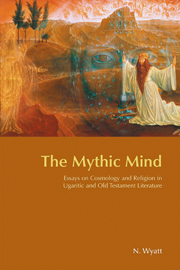Book contents
- Frontmatter
- Contents
- Preface
- Acknowledgments
- Abbreviations
- Chapter 1 THE PROBLEM OF THE ‘GOD OF THE FATHERS’
- Chapter 2 THE DEVELOPMENT OF THE TRADITION IN EXODUS 3
- Chapter 3 THE SIGNIFICANCE OF THE BURNING BUSH
- Chapter 4 WHO KILLED THE DRAGON?
- Chapter 5 SEA AND DESERT: SYMBOLIC GEOGRAPHY IN WEST SEMITIC RELIGIOUS THOUGHT
- Chapter 6 SYMBOLS OF EXILE
- Chapter 7 OF CALVES AND KINGS: THE CANAANITE DIMENSION IN THE RELIGION OF ISRAEL
- Chapter 8 THE DARKNESS OF GENESIS 1.2
- Chapter 9 THE SIGNIFICANCE OF SPN IN WEST SEMITIC THOUGHT: A CONTRIBUTION TO THE HISTORY OF A MYTHOLOGICAL MOTIF
- Chapter 10 THE VOCABULARY AND NEUROLOGY OF ORIENTATION: THE UGARITIC AND HEBREW EVIDENCE
- Chapter 11 THE MYTHIC MIND
- Chapter 12 ‘WATER, WATER EVERYWHERE…’: MUSINGS ON THE AQUEOUS MYTHS OF THE NEAR EAST
- Chapter 13 ANDROGYNY IN THE LEVANTINE WORLD
- Bibliography
- Index of References
- Index of Names and Places
Chapter 12 - ‘WATER, WATER EVERYWHERE…’: MUSINGS ON THE AQUEOUS MYTHS OF THE NEAR EAST
- Frontmatter
- Contents
- Preface
- Acknowledgments
- Abbreviations
- Chapter 1 THE PROBLEM OF THE ‘GOD OF THE FATHERS’
- Chapter 2 THE DEVELOPMENT OF THE TRADITION IN EXODUS 3
- Chapter 3 THE SIGNIFICANCE OF THE BURNING BUSH
- Chapter 4 WHO KILLED THE DRAGON?
- Chapter 5 SEA AND DESERT: SYMBOLIC GEOGRAPHY IN WEST SEMITIC RELIGIOUS THOUGHT
- Chapter 6 SYMBOLS OF EXILE
- Chapter 7 OF CALVES AND KINGS: THE CANAANITE DIMENSION IN THE RELIGION OF ISRAEL
- Chapter 8 THE DARKNESS OF GENESIS 1.2
- Chapter 9 THE SIGNIFICANCE OF SPN IN WEST SEMITIC THOUGHT: A CONTRIBUTION TO THE HISTORY OF A MYTHOLOGICAL MOTIF
- Chapter 10 THE VOCABULARY AND NEUROLOGY OF ORIENTATION: THE UGARITIC AND HEBREW EVIDENCE
- Chapter 11 THE MYTHIC MIND
- Chapter 12 ‘WATER, WATER EVERYWHERE…’: MUSINGS ON THE AQUEOUS MYTHS OF THE NEAR EAST
- Chapter 13 ANDROGYNY IN THE LEVANTINE WORLD
- Bibliography
- Index of References
- Index of Names and Places
Summary
Water, water everywhere,
Nor any drop to drink.
Samuel Taylor ColeridgeAnd sense the solving emptiness
that lies just under all we do.
Philip LarkinIntroduction
Scholars who work in some of the disciplines which make up the field of Near Eastern studies are generally inclined to emphasize the distinctive nature of its various parts, rather than to discern and discuss the broad similarities which may link ideas across cultural boundaries. This is an admirable stance, especially as the disciplines emerge as independent subjects of study. Autonomy is not only an academic desideratum, but is seen as a cultural and historical virtue. But this tendency is paralleled by a similar tendency to isolationism between different disciplines which might benefit from cross-fertilization.
Those who are afraid to make mistakes will usually contribute little to the sum of human knowledge. They will play safe, never stepping out of line from the current view, never challenging the paradigm. Many volumes are published each year in which all that has been achieved is a slight rearrangement of the pieces on the board. Consensus is the order of the day. Real contributions are commonly made by those who are prepared to take the risk, and not only to challenge the consensus and rattle the bars of the paradigm-cage, but also to speculate and ask new questions about an old problem, and even identify new ones.
- Type
- Chapter
- Information
- The Mythic MindEssays on Cosmology and Religion in Ugaritic and Old Testament Literature, pp. 189 - 237Publisher: Acumen PublishingPrint publication year: 2005



